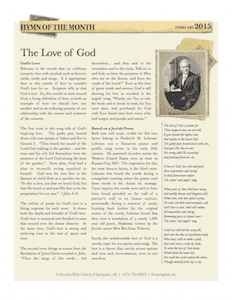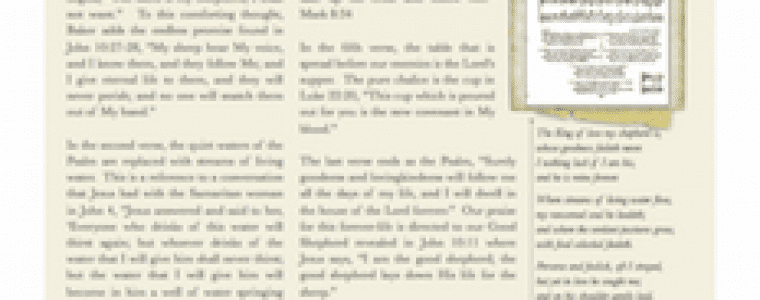The Love of God
God’s Love
 February is the month that we celebrate romantic love with symbols such as flowers, cards, candy and songs. It is appropriate then in this month of love to consider God’s love for us. Scripture tells us that God is love. So, this month we look toward God, a living definition of love, as both an example of how we should love one another and as an enduring promise of our relationship with the creator and sustainer of the universe.
February is the month that we celebrate romantic love with symbols such as flowers, cards, candy and songs. It is appropriate then in this month of love to consider God’s love for us. Scripture tells us that God is love. So, this month we look toward God, a living definition of love, as both an example of how we should love one another and as an enduring promise of our relationship with the creator and sustainer of the universe.
The love of God is greater far
Than tongue or pen can ever tell;
It goes beyond the highest star,
And reaches to the lowest hell;
The guilty pair, bowed down with care,
God gave His Son to win;
His erring child He reconciled,
And pardoned from his sin.
The first verse in this song tells of God’s forgiving love. The guilty pair, bowed down with care speaks of Adam and Eve in Genesis 3. “They heard the sound of the Lord God walking in the garden… and the man and his wife hid themselves from the presence of the Lord God among the trees of the garden.” Even then, God had a plan to reconcile erring mankind to himself. God sent his own Son in the likeness of sinful flesh as a sacrifice for sin. “In this is love, not that we loved God, but that He loved us and sent His Son to be the propitiation for our sins.” 1 John 4:10
O love of God, how rich and pure!
How measureless and strong!
It shall forevermore endure
The saints’ and angels’ song.
The refrain of praise for God’s love is a fitting response for each verse. It shows both the depth and breadth of God’s love. God’s love is nuanced and detailed in ways that reward even the closest observer. At the same time, God’s love is strong and enduring even to the end of space and time.
When years of time shall pass away,
And earthly thrones and kingdoms fall,
When men, who here refuse to pray,
On rocks and hills and mountains call,
God’s love so sure, shall still endure,
All measureless and strong;
Redeeming grace to Adam’s race—
The saints’ and angels’ song.
The second verse brings in scenes from the book of Revelation. “Then the kings of the earth… hid themselves… and they said to the mountains and to the rocks, ‘Fall on us and hide us from the presence of Him who sits on the throne, and from the wrath of the Lamb’” Even at this time of great wrath and sorrow, God is still showing his love as revealed in the angels’ song, “Worthy are You to take the book and to break its seals; for You were slain, and purchased for God with Your blood men from every tribe and tongue and people and nation.”
Could we with ink the ocean fill,
And were the skies of parchment made,
Were every stalk on earth a quill,
And every man a scribe by trade,
To write the love of God above,
Would drain the ocean dry.
Nor could the scroll contain the whole,
Though stretched from sky to sky.
Based on a Jewish Poem
Both text and music credits for this love hymn belong to Frederick M. Lehman. Lehman was a Nazarene pastor and prolific song writer in the early 20th century. He pastored churches across the Western United States even as close as Kansas City, MO. The inspiration for this, his most famous hymn, is the third verse. Lehman first heard the words during a evangelistic meeting where the pastor used these words at the climax his message. Upon inquiry, the words were said to have been found penciled on the wall of a patient’s room in an insane asylum, presumedly during a moment of sanity. Looking back further for the original source of the words, Lehman found that they were a translation of a nearly 1,000 year old poem, Haddamut, written by the Jewish cantor Meir Ben Isaac Nehorai.
Surely, the unfathomable love of God is a worthy topic for our poetry and songs. His love is a theme that carries across nations and time and circumstances, even to our own lives.



